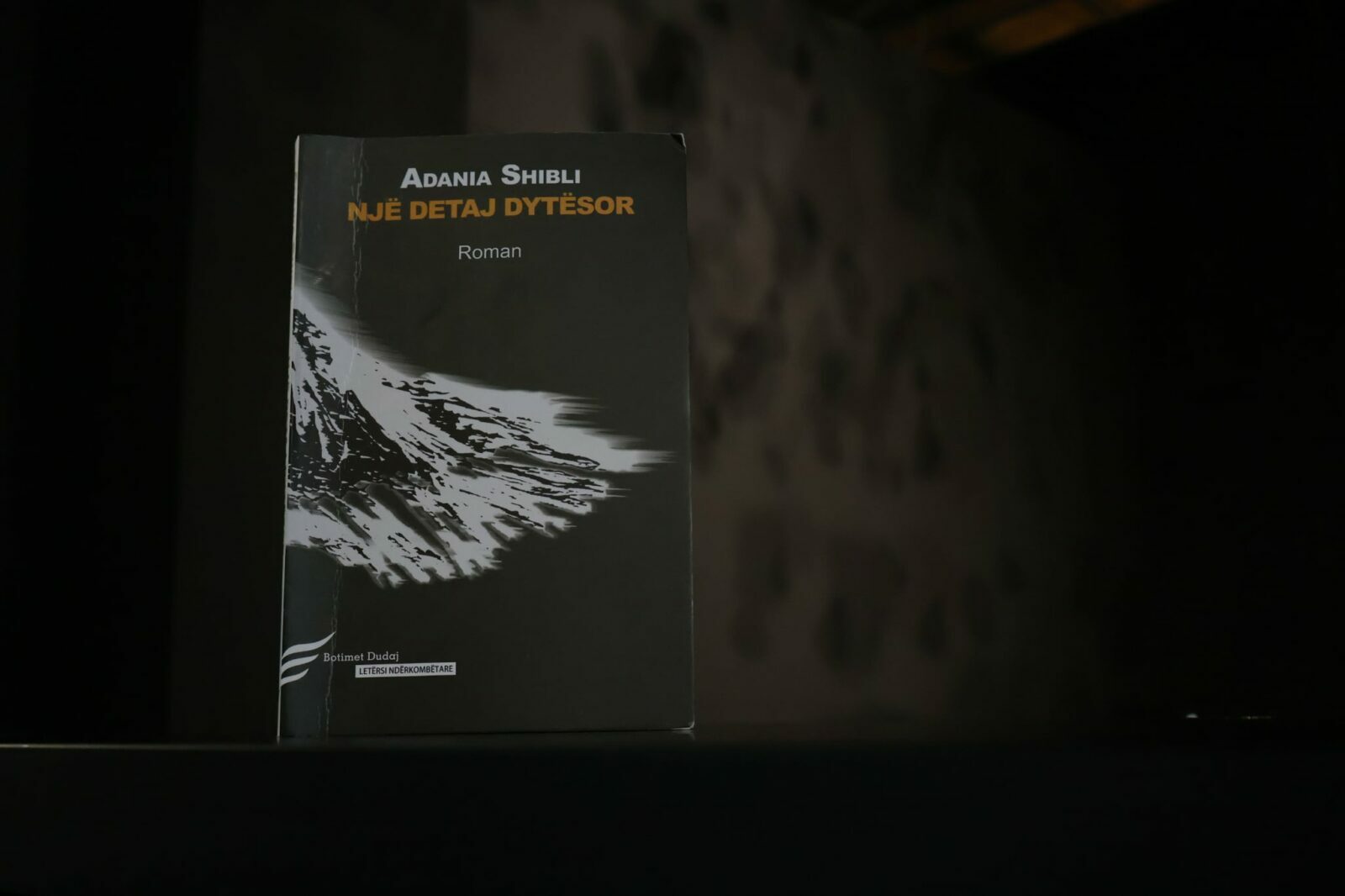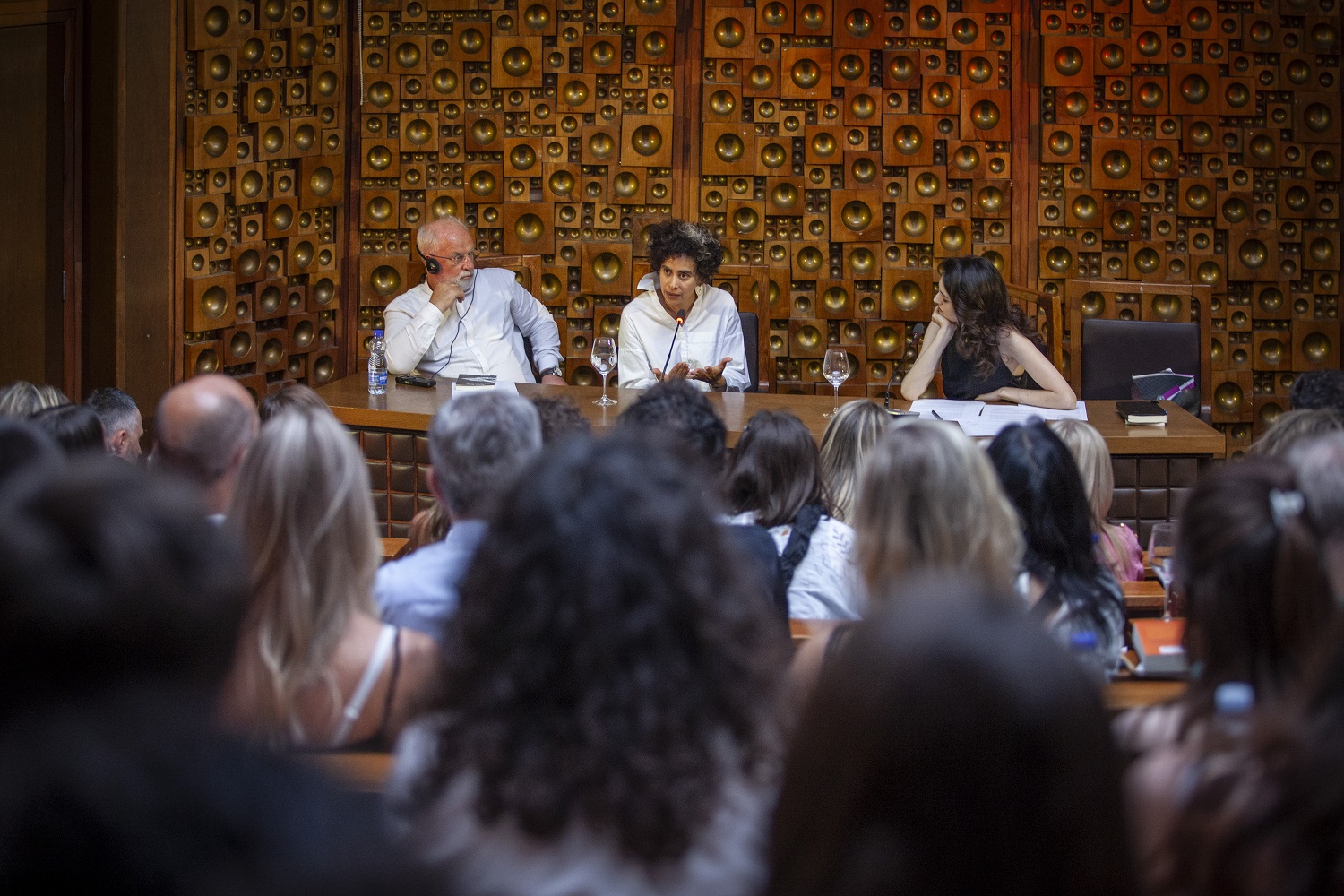Internationally renowned Palestinian novelist Adania Shibli highlights the importance of literary translations in learning from shared traumatic experiences, after the Albanian translation of her well-known novel “Minor Detail” was introduced in Kosovo.
The internationally acclaimed novel “Minor Detail,” by prominent Palestinian novelist Adania Shibli, has been translated into Albanian for the first time, bringing one of the most prominent voices in contemporary Arabic literature to Albanian speaking readers.
After a public discussion last week at the National Library of Kosovo, in the capital Prishtina, Shibli told Prishtina Insight that she believes that people in the Western Balkans and in Palestine, “do not [currently] have knowledge or experiences of each other.”
The discussion, hosted by the Kosovo NGO Cultural Heritage Without Borders, CHwB, on June 19, celebrated the translation of Shibli’s book into Albanian. Shibli talked to her readers in Prishtina about how in silence one experiences the immensity of being, about language and oppression, and about how the untold stories of the past influenced her novel “Minor Detail,” which was first published in Arabic in 2017.
“Minor Detail” is a haunting novel split in two parts, which are set decades apart. The first part, written in sparse prose, recounts the true story of the 1949 rape and murder of a young Palestinian-Bedouin girl by Israeli soldiers in the Negev desert. The second part tells of a modern-day woman in Ramallah who stumbles upon a newspaper article about the rape and becomes haunted by one minor detail—the fact that the sexual assault happened 25 years to the day before she was born.
“We never learn about our own experiences,” Shibli told Prishtina Insight, explaining that she believes that simply being informed of current affairs is not enough for a proper understanding of shared traumatic experiences. For her, literature is not only a bridge across geographies, but a way of addressing the inherited silence of past traumas.
“I think literature is important to translate: like into Arabic, and from Arabic to Albanian,” she added.
Her novel “Minor Detail” gained global attention following the postponement of her award ceremony for the 2023 “Liberaturpreis” (in English “Liberatur Award”), given by the German literary organization LitProm and planned for the 75th Frankfurt Book Fair in mid-October 2023. The event was postponed because of accusations that her work was antisemitic.
On October 7, 2023—eleven days before the Frankfurt Book Fair took place—Hamas launched a deadly attack on southern Israel, killing more than 1,200 people and taking 251 hostages. Israel’s retaliation has, according to the Hamas-controlled Gaza Health Ministry, led to the killing of over 56,000 Palestinians, including both fighters and civilians, and up to a third of them children, as well as the widespread destruction of homes and infrastructure.
In November 2023, Shibli told The Guardian that she “was abruptly disinvited [from the Frankfurt Book Fair] ‘in a brief email’ with LitProm citing the war between Israel and Palestine.”
Following the controversy with the Frankfurt Book Fair, a letter criticizing the postponement of her award was signed by more than 1,500 authors including Nobel prize winners Annie Ernaux, Abdulrazak Gurnah, and Olga Tokarczuk.
Silence, war, and repression

Adania Shibli’s book “Minor Detail” translated in Albanian. Photo: BIRN/Rea Kurtaj
On June 19, Shibli, now 51 years old, said to her readers that she grew up in Palestine “thinking about Kosovo,” drawing attention to the similarities between the people of Kosovo and Palestine experiences of occupation, repression, and war.
Shibli went on to explain how emotionally resonant her first visit to Kosovo was, “I am deeply moved by being here, being with you.”
“I grew up realizing that language cannot withhold us, but still I trust so much in language and I was always tormented by this love of language, a language that also does not recognize my presence, and the irrationality of my experience because it is irrational,” she explained, adding that “you cannot believe in the rationality that there is a reason for oppressing you, it only can be irrational.”
Shibli reflected on how Palestinians are often stereotyped as irrational or as people who demand too much, when in reality, “they are simply asking for what is rightfully theirs.”
According to her, the negative labels and characterizations of Palestinians, who are told, among other things, that they are exaggerating or that they cannot express themselves properly, led her to think about how such accusations might be reimagined as narrative tools.
“Can all these be tools for narration?” she contemplated while recounting her journey to becoming a writer.
“My parents were survivors of 1948”, Nakba the mass displacement of Palestinians, Shibli told her readers in Prishtina, explaining that her parents were only 15 years old at the time and that they never spoke about it with her or any of her siblings.
“This is basically the silence of our parents that we all know. And we all went through that, and I think by knowing each other, what we create through that, is very important,” Shibli explained to Prishtina Insight, referring to the silence of generations that experienced the trauma of conflict.
Shibli also shared a childhood memory with her readers in Prishtina, identifying it as the moment that started her lifelong engagement with structures of power, storytelling, and silencing.
She recalled being bullied by an older sister and when she finally tried to defend herself, her sister cleverly manipulated the situation, crafting a false but convincing narrative that cast Shibli as the aggressor. Their mother believed the story, and Shibli—unable to articulate her version—was punished.
“I was speechless because the story [my sister] told was perfect,” Shibli recalled. She was struck by the power of her sister’s storytelling and how effective it was despite not being true. “That story also told me that, the combination of not being able to tell a story, and at the same time being fascinated by a story… they come together—the fascination and the inability,” Shibli said.
Diona Budima, the Research and Education Coordinator at the CHwB Heritage Space, who hosted the public discussion with Shibli, told Prishtina Insight that, “coming from our Kosovar context—marked by war, colonialism, and trauma—we seek ways to engage with histories that often exist in fragmented memory landscapes and under threat of erasure. Shibli’s work holds space for exactly these kinds of questions.”
CHwB Heritage Space is an experimental cultural initiative dedicated to connecting the preservation of cultural heritage with contemporary and alternative practices in the arts, humanities and social sciences. Their programme “In Conversation,” to which Shibli was invited to, aims to engage the community through public events that address contemporary issues at the intersection of culture, history, and politics.
“I hope her visit [to Prishtina] sparks the interest of the [ethnic] Albanian public, who share so much with the Palestinian people, [and that they decide] to read this remarkable writer in their own language,” Budima added.
Literature as a means of resistance

Adania Shibli (C) during a public discussion in Prishtina, Kosovo, June 19, 2025. Photo: CHwB Kosova/Majlinda Hoxha
“There is no reason to feel responsible for her, for a stranger who will remain a stranger, and whose voice will never be heard again by anyone” Arlinda Hovi Dudaj, president of the Tirana based publishing house “Dudaj” which published the novel “Minor Detail” in Albanian, read from Shibli’s book in Albanian, claiming it had impacted her personally.
“In the book [peace] doesn’t happen. Is [having peace] even possible,” she asked Shibli.
Quoting Franz Kafka, Shibli laughed and said: “There is hope, but not for us!”
Shibli’s novel “Minor Detail” was translated by Isa Memishi, professor of oriental studies at the University of Prishtina.
During his speech at the National Library, Memishi described Shibli’s novel not just as a literary work, but as part of a long tradition of Palestinian resistance through writing.
“Adania does not come as an isolated voice, but as a necessary new link in the chain of authors who have shaped Palestinian literature,” he said.
“In the poetry of Mahmoud Darwish, we find the elegy of a nation speaking to itself, so as not to dissolve into oblivion. He gave words to the homeland in exile, turning them into a poetic identity card. In the work of Ghassan Kanafani, pain takes the shape of narrative, dense and direct, that shakes the reader’s conscience. He teaches us that a person can perish under the desert sun not only from hunger but from a lack of dignity. Ibrahim Nasrallah, on the other hand, constructs memory as a novel that never ends, where every character carries the marks of a collective history, and every narrative is a call not to accept the normalization of violence,” Memishi said in Prishtina on June 19.
He added that it is against this backdrop that Shibli appears “with a voice that is different, but no less powerful.”





